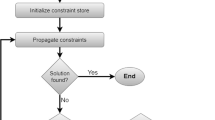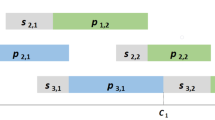Abstract
According to the state of the art of no-wait scheduling problem, practitioners have mostly concentrated on pure no-wait flow shop scheduling problem. In the most real world production cases, flow shops operate with uniform parallel machines at each stage to eliminate or reduce the bottleneck stages with aim of enhancing the efficiency of production. This paper deals with a no-wait scheduling problem considering anticipatory sequence-dependent setup times on the flexible flow shop environment with uniform parallel machines. The objective is to find the sequence which minimizes maximum completion time of jobs (i.e. makespan). Since this problem is known to be NP-hard, we introduce a novel approach to tackle the problem. In the solution approach, firstly a heuristic formulation is used for objective function evaluation. Afterwards, principles of meta-heuristic algorithms namely invasive weed optimization, variable neighborhood search and simulated annealing algorithms are hybridized as solution method of the problem. In addition, a Taguchi method is employed for calibration of parameters and operators of the proposed hybrid meta-heuristic. Various computational experiments in two scales of small and large are established to illustrate the effectiveness and robustness of the proposed method. Finally, the experimental results revealed the superiority of the performance of the hybrid meta-heuristic in comparison with original ones singularly.










Similar content being viewed by others
Abbreviations
- IWO:
-
Invasive weed optimization
- VNS:
-
Variable neighborhood search
- SA:
-
Simulated annealing
- ACO:
-
Ant colony optimization
- GA:
-
Genetic algorithm
- SIWOVNSSA:
-
Semi invasive weed optimization-variable neighborhood search-simulated annealing
- FFS:
-
Flexible flow shop
- NWFFSSP:
-
No-wait flexible flow shop scheduling problem
- MDA:
-
Minimum deviation algorithm
- LPT:
-
Latest processing time
- SDST:
-
Sequence dependent setup times
- NSDST:
-
Non-anticipatory sequence dependent setup time
- ASDST:
-
Anticipatory sequence-dependent setup times
- RPD:
-
Relative percentage deviation
- ARPD:
-
Average relative percentage deviation
- FFE:
-
Fractional factorial experiment
- OA:
-
Orthogonal array
- LSD:
-
Least significant difference
References
Ajorlou, S., & Shams, I. (2012). Artificial bee colony algorithm for CONWIP production control system in a multi-product multi-machine manufacturing environment. Journal of Intelligent Manufacturing. doi:10.1007/s10845-012-0646-5.
Aldowaisan, T. A. (2001). A new heuristic and dominance relations for no-wait flowshops with setup times. Computers and Operations Research, 28(6), 563–584.
Allahverdi, A. (1997). Scheduling in stochastic flowshops with independent setup, processing and removal times. Computers and Operations Research, 24(11), 995–960.
Allahverdi, A., & Aldowaisan, T. (2001). Minimizing total completion time in a no-wait flowshop with sequence-dependent additive changeover times. Journal of the Operational Research Society, 52, 449–462.
Arnaout, J.-P., Musa, R., & Rabadi, G. (2012). A two-stage Ant Colony optimization algorithm to minimize the makespan on unrelated parallel machines—part II: Enhancements and experimentations. Journal of Intelligent Manufacturing. doi:10.1007/s10845-012-0672-3.
Baker, K. (1974). Introduction to sequence and scheduling. New York: Wiley.
Belmecheri, F., Prins, C., Yalaoui, F., & Amodeo, L. (2012). Particle swarm optimization algorithm for a vehicle routing problem with heterogeneous fleet, mixed backhauls, and time windows. Journal of intelligent manufacturing. doi:10.1007/s10845-012-0627-8.
Bertel, S., & Billaut, J. (2004). A genetic algorithm for an industrial multiprocessor flow shop scheduling problem with recirculation. European Journal of Operational Research, 159(3), 651–62.
Blum, C., Puchinger, J., Raidl, G. R., & Roli, A. (2011). Hybrid metaheuristics in combinatorial optimization: A survey. Applied Soft Computing, 11, 4135–4151.
Cochran, W. G., & Cox, G. M. (1992). Experimental designs (2nd ed.). New York: Wiley.
Conway, R., & Maxwell, W. (1967). Theory of scheduling. Reading, MA: Addison-Wesley.
Dessouky, M. M., Dessouky, M. I., & Verma, S. K. (1998). Flowshop scheduling with identical jobs and uniform parallel machines. European Journal of Operational Research, 109(3), 620–31.
Eren, T., & Güner, T. E. (2006). A bicriteria scheduling with sequence-dependent setup times. Applied Mathematics and Computation, 179, 378–385.
Gupta, J. N. D., Strusevich, V. A., & Zwaneveld, C. (1997). Two-stage no-wait scheduling models with setup and removal times. Computers and Operations Research, 24(11), 1025–1031.
Hansen, P., & Mladenovic, N. (2001). Variable neighborhood search: Principles and applications. European Journal of Operational Research, 130, 449–467.
Huang, W., & Li, S. (1998). A two-stage hybrid flowshop with uniform machines and setup times. Mathematical and Computer Modelling, 27(2), 27–45.
Huang, R. H., Yang, C. L., & Huang, Y. (2009). No-wait two-stage multiprocessor flow shop scheduling with unit setup. International Journal of Advanced Manufacturing Technology, 44, 921–927.
Jolai, F., Sheikh, S., Rabbani, M., & Karimi, B. (2009). A genetic algorithm for solving no-wait flexible flow lines with due window and job rejection. The International Journal of Advanced Manufacturing Technology, 42(5), 523–532.
Karimkashi, S., & Kishk, A. (2010). Invasive weed optimization and its features in electromagnetics. IEEE Transactions on Antennas and Propagation, 58(4), 1269–1278.
Kyparisis, G. J., & Koulamas, C. (2006a). A note on makespan minimization in two-stage flexible flow shops with uniform machines. European Journal of Operational Research, 175(2), 1321–1327.
Kyparisis, G. J., & Koulamas, C. (2006b). Flexible flow shop scheduling with uniform parallel machines. European Journal of Operational Research, 168(3), 985–997.
Li, X., Yalaoui, F., Amodeo, L., & Chehade, H. (2012). Metaheuristics and exact methods to solve a multiobjective parallel machines scheduling problem. Journal of Intelligent Manufacturing, 23(4), 1179–1194.
Lozanoa, M., & García-Martínez, C. (2010). Hybrid metaheuristics with evolutionary algorithms specializing in intensification and diversification: Overview and progress report. Computers & Operations Research, 37, 481–497.
Mehrabian, A. R., & Lucas, C. (2006). A novel numerical optimization algorithm inspired from weed colonization. Ecological Informatics, 1, 355–366.
Metropolis, N., Rosenbluth, A. W., Rosenbluth, M. N., Teller, A. H., & Teller, E. (1953). Equations of state calculations by fast computing machines. Journal of Chemical Physics, 21, 1087–1092.
Mirabi, M., Ghomi, S. F., & Jolai, F. (2013). A two-stage hybrid flowshop scheduling problem in machine breakdown condition. Journal of Intelligent Manufacturing, 24(1), 193–199.
Mirsanei, H. S., Zandieh, M., Moayed, M. J., & Khabbazi, M. R. (2011). A simulated annealing algorithm approach to hybrid flow shop scheduling with sequence-dependent setup times. Journal of Intelligent Manufacturing, 22(6), 965–978.
Moradinasab, N., Shafaei, R., Rabiee, M., & Ramezani, P. (2012). No-wait two stage hybrid flow shop scheduling with genetic and adaptive imperialist competitive algorithms. Journal of Experimental & Theoretical Artificial Intelligence. doi:10.1080/0952813X.2012.682752.
Panwalkar, S. S., Dudek, R. A., & Smith, M. L. (1973). Sequencing research and the industrial scheduling problem. In Elmaghra, S. E. (Ed.) Symposium on the theory of scheduling and its applications. New York: Springer, p. 29. International Journal of Advanced Manufacturing Technology, 49, 263–279 (2010).
Rebai, M., Kacem, I., & Adjallah, K. H. (2012). Earliness-tardiness minimization on a single machine to schedule preventive maintenance tasks: Metaheuristic and exact methods. Journal of Intelligent Manufacturing, 23(4), 1207–1224.
Ross, R. J. (1989). Taguchi techniques for quality engineering. New York: McGraw-Hill.
Rossi, A., Puppato, A., & Lanzetta, M. (2012). Heuristics for scheduling a two-stage hybrid flow shop with parallel batching machines: Application at a hospital sterilisation plant. International Journal of Production Research. doi:10.1080/00207543.2012.737942.
Roy, G. G., Das, S., Chakraborty, P., & Suganthan, P. N. (2011). Design of non-uniform circular antenna arrays using a modified invasive weed optimization algorithm. IEEE Transactions on Antennas and Propagation, 59(1), 110–118.
Ruiz, R., & Maroto, C. (2006). A genetic algorithm for hybrid flowshops with sequence dependent setup times and machine eligibility. European Journal of Operational Research, 169(3), 781–800.
Salvador, M. S. (1973). A solution to a special case of flow shop scheduling problems. In Symposium of the theory of scheduling and applications (pp. 83–91). NewYork: Springer.
Sevastianov, S. V. (2002). Geometrical heuristics for multiprocessor flowshop scheduling with uniform machines at each stage. Journal of Scheduling, 5(3), 205–25.
Soewandi, H., & Elmaghraby, S. E. (2003). Sequencing on two-stage hybrid flowshops with uniform machines to minimize makespan. IIE Transactions, 35(5), 467–477.
Sriscandarajah, C., & Ladet, P. (1986). Some no-wait shops scheduling problems: Complexity aspects. European Journal of Operational Research, 24, 424–445.
Tang, L., Liu, W., & Liu, J. (2005). A neural network model and algorithm for the hybrid flow shop scheduling problem in a dynamic environment. Journal of Intelligent Manufacturing, 16(3), 361–370.
Tavakkoli-Moghaddam, R., Ranjbar-Bourani, M., Amin, G. R., & Siadat, A. (2012). A cell formation problem considering machine utilization and alternative process routes by scatter search. Journal of Intelligent Manufacturing, 23(4), 1127–1139.
Tsai, J. T., Ho, W. H., Liu, T. K., & Chou, J. H. (2007). Improved immune algorithm for global numerical optimization and job-shop scheduling problems. Applied Mathematics and Computation, 194(2), 406–24.
Tseng, C. T., & Liao, C. J. (2008). A particle swarm optimization algorithm for hybrid flowshop scheduling with multiprocessor tasks. International Journal of Production Research, 46(17), 4655–4670.
Tseng, L. Y., & Lin, Y. T. (2010). A hybrid genetic algorithm for no-wait flow shop scheduling problem. International Journal of Production Economics, 128, 144–152.
Urlings, T., Ruiz, R., & Stützle, T. (2010). Shifting representation search for hybrid flexible flowline problems. European Journal of Operational Research, 207, 1086–1095.
Vahdani, B., Tavakkoli-Moghaddam, R., Zandieh, M., & Razmi, J. (2012). Vehicle routing scheduling using an enhanced hybrid optimization approach. Journal of Intelligent Manufacturing, 23(3), 759–774.
Verma, S. K., & Dessouky, M. M. (1999). Multistage hybrid flowshop scheduling with identical jobs and uniform parallel machines. Journal of scheduling, 2, 135–50.
Wang, L., Pan, Q. K., & Tasgetiren, M. F. (2011). A hybrid harmony search algorithm for the blocking permutation flow shop scheduling problem. Computers & Industrial Engineering, 61, 76–83.
Wang, I. L., Yang, T., & Chang, Y. B. (2012). Scheduling two-stage hybrid flow shops with parallel batch, release time, and machine eligibility constraints. Journal of Intelligent Manufacturing, 23(6), 2271–2280.
Wang, Z., Xing, W., & Bai, F. (2005). No-wait flexible flow shop scheduling with no-idle machines. Operation Research Letter, 33, 609–614.
Xie, J., & Wang, X. (2005). Complexity and algorithms for two-stage flexible flow shop scheduling with availability constraints. Computer and Mathematics with Application, 50, 1629–1638.
Xie, J., Xing, W., Liu, Z., & Dong, J. (2004). Minimum deviation algorithm for two-stageno-wait flowshops with parallel machines. Computers & Mathematics with Applications, 47(12), 1857–63.
Yaurima, V., Burtseva, L., & Tchernykh, A. (2009). Hybrid flowshop with unrelated machines, sequence-dependent setup time, availability constraints and limited buffers. Computers & Industrial Engineering, 56, 1452–1463.
Ying, K. C., & Lin, S. W. (2006). Multiprocessor task scheduling in multistage hybrid flowshops: an ant colony system approach. International Journal of Production Research, 44(16), 3161–3177.
Zandieh, M., & Karimi, N. (2011). An adaptive multi-population genetic algorithm to solve the multi-objective group scheduling problem in hybrid flexible flowshop with sequence-dependent setup times. Journal of Intelligent Manufacturing, 22(6), 979–989.
Zhang, Y., & Li, X. (2011). Estimation of distribution algorithm for permutation flow shops with total flow time minimization. Computers & Industrial Engineering, 60, 706–718.
Author information
Authors and Affiliations
Corresponding author
Rights and permissions
About this article
Cite this article
Ramezani, P., Rabiee, M. & Jolai, F. No-wait flexible flowshop with uniform parallel machines and sequence-dependent setup time: a hybrid meta-heuristic approach. J Intell Manuf 26, 731–744 (2015). https://doi.org/10.1007/s10845-013-0830-2
Received:
Accepted:
Published:
Issue Date:
DOI: https://doi.org/10.1007/s10845-013-0830-2




